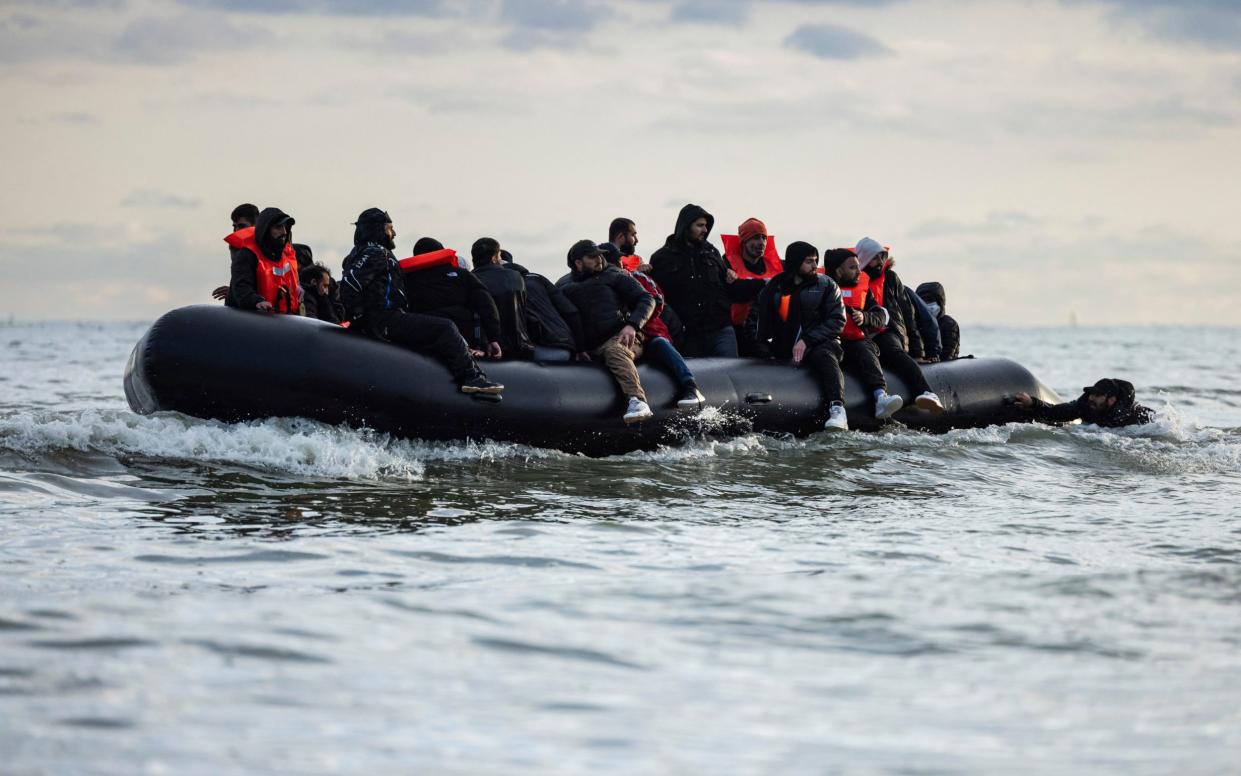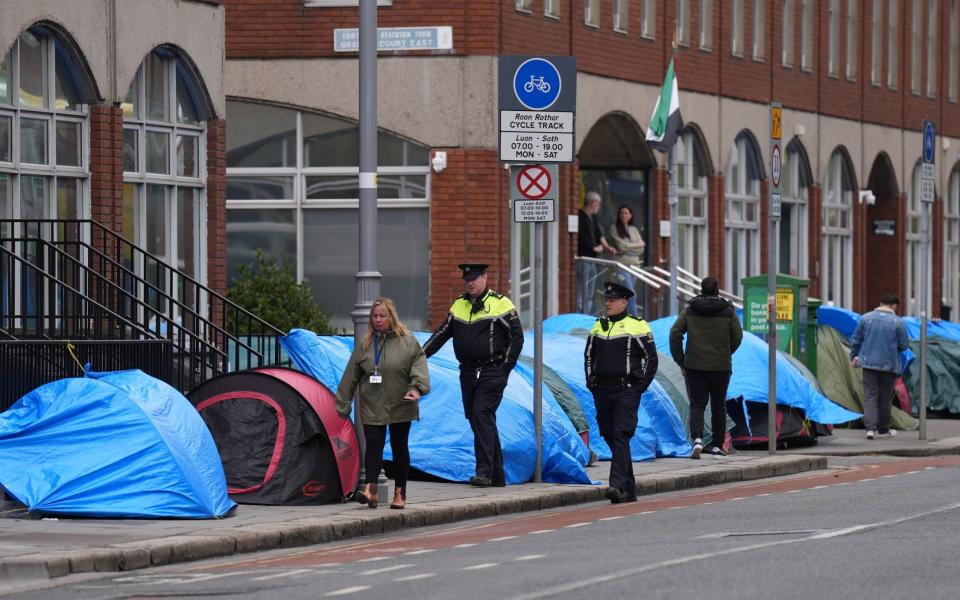Missing migrants earmarked for Rwanda ‘will probably turn up in Ireland’

Migrants earmarked for the first deportation flights to Rwanda will disappear and “probably” end up in Ireland, a former Border Force chief has warned.
The warning from Kevin Saunders, the former chief immigration officer, came as the Home Office admitted that it was unable to locate thousands of migrants it intends to start detaining this week ready for deportation to Rwanda.
More than 5,700 migrants have been identified for removal but only 2,145 continue to report to the Home Office and can be located for detention, according to a document released on Monday.
The Home Office has said the remaining 3,557 have not necessarily absconded but are not subject to reporting restrictions, which means they cannot be located for detention.
Mr Saunders, who was chief immigration officer from 2001 to 2016, said that the migrants were originally identified for deportation to Rwanda after arriving in 2022 and last year, but had so far avoided removal.
“Now that we have the new Rwanda Act on the table, they are worried they are going to be removed – so they have done a disappearing act,” said Mr Saunders.
Asked on BBC Radio 4 whether the Home Office was wrong to claim they were not missing, he said: “I would not like to say the Home Office are telling porkies. Let’s say they temporarily cannot find them.
“It is people they have lost contact with. They are not going to appear, certainly not in the UK. They will probably turn up in Ireland. They know they are in the frame to be removed. They don’t want to be removed, so they are going to disappear.”
Mr Saunders said he believed the Rwanda deportation scheme would work and act as a deterrent, but he added that he would have preferred for all migrants entering the UK illegally across the Channel to be detained despite the huge cost.
The disclosure comes amid a growing row between the UK and Ireland, which is drawing up emergency legislation to return asylum seekers back to the UK.
Ireland claims that 80 per cent of asylum seekers turning up in Dublin have crossed the border from Northern Ireland in order to avoid being sent to Rwanda.
Victoria Atkins, the Health Secretary, said law enforcement agencies would be pursuing asylum seekers who have failed to keep in contact with the Home Office, a Cabinet minister has said.
She told GB News: “We know the success that law enforcement have had, there’s a range of measures that they can use, not just in removing 25,000 immigrants last year but also, importantly, making immigration raids and closing some 7,000 bank accounts so people cannot live and work in the United Kingdom once they fall off the radar.”
The document, updated on the Home Office’s website on Monday, also acknowledges there could be further delays to deportations caused by MPs making last-minute representations to suspend removals.
There is a long-standing parliamentary convention whereby removals can be suspended until a case has been considered and a response issued to the MP.
The assessment says that given the “novel nature” of the scheme, “we may expect future (Migration and Economic Development Partnership) cases to attract significant attention from MPs, and responders may be overwhelmed by cases, causing a delay or removal to be cancelled pending a response”.
The migrants identified for removal to Rwanda have all previously been issued with a “notice of intent” to treat their asylum claims as inadmissible. There’s 34,113 people who have been told their claim was inadmissible.
Afghans make up the largest group with the notices, followed by Albanians, Iranians, Eritreans, Syrians, Iraqis and Sudanese. The numbers largely reflect the number of people who crossed the Channel illegally between January 2022 and June last year.
It comes as Ireland’s prime minister demanded that Rishi Sunak honour a post-Brexit migration deal that he said would allow Dublin to send asylum seekers back to the UK.
Simon Harris, Ireland’s prime minister, repeated Dublin’s insistence that there was a post-Brexit agreement to return failed asylum seekers to the UK and there was a “legitimate expectation” that it would be honoured by Britain.
He said that new legislation would give it a legal base after a High Court decision that the Irish government broke EU law when it designated the UK as a safe country after Brexit.
Speaking on his way into Cabinet on Tuesday, Mr Harris said: “Of course, this country is going to change our law to give practical legal effect to what is already agreed between Ireland and Britain and has been since 2020.
“There’s already an agreement in place between Ireland and Britain. What we’re doing is giving legal clarity in relation to that agreement, which will allow us to designate the UK as a safe country again.
“It’s also very important for people in Britain to understand that this is a two-way agreement. This is to ensure that refugees can be sent in both directions if their application is inadmissible. This is a country that adopts a very simple common sense approach – if you reach an agreement with another country, you implement it.”
Mr Sunak said on Monday he had “no interest” in taking back refugees who crossed into the Republic from Northern Ireland, which he said proved the deterrent effect of the Rwanda Plan was working.
On Tuesday, the Prime Minister’s spokesman maintained that Britain would not take back asylum seekers who crossed the border into Ireland as long as France and the EU refused to take back migrants who crossed the Channel.

It was announced on Tuesday that the Irish government would redeploy 100 police officers to join the prevention and deportation effort, including near the border, which Dublin insisted had to remain open during the Brexit negotiations.
The Justice Ministry will take on asylum processing duties to free up the officers to take part in frontline duties, including deportations and checks close to the border. Helen McEntee, the Justice Minister, briefed the Cabinet on steps being taken to prevent abuse of the Common Travel Area between the UK and Ireland.
She said: “We have to be able to return people to the UK, but there is an arrangement in place. We’ve been working with the UK and I don’t expect that that will change.”
She admitted that no asylum seekers had been returned to Britain for several years, which she blamed on Brexit, Covid and the High Court judgement that the UK was not a safe country because of the Rwanda plan.
Irish sources have said the situation is “messy” because of the difficulties in policing an open border.
Mr Harris suggested Mr Sunak’s insistence that the UK would not take back asylum seekers from Ireland was motivated by the forthcoming local elections.
He added: “We have every right to have our own migration policy. Our people have every expectation that it will be enforced, that it will be firm, that it will be rules-based. And I think we also will have a legitimate expectation that agreements between two countries are honoured.”
Mr Harris said that the country from which Ireland is receiving the most asylum applications is Nigeria, and applications are now being fast-tracked.
Micheal Martin, the deputy prime minister, said on Monday that the claim that 80 per cent of asylum seekers in Ireland had crossed the border from Northern Ireland was not “evidence based”.
Anti-immigration groups in Ireland have ratcheted up tensions over migration, which have been exacerbated by a housing crisis in the country of some five million people.

